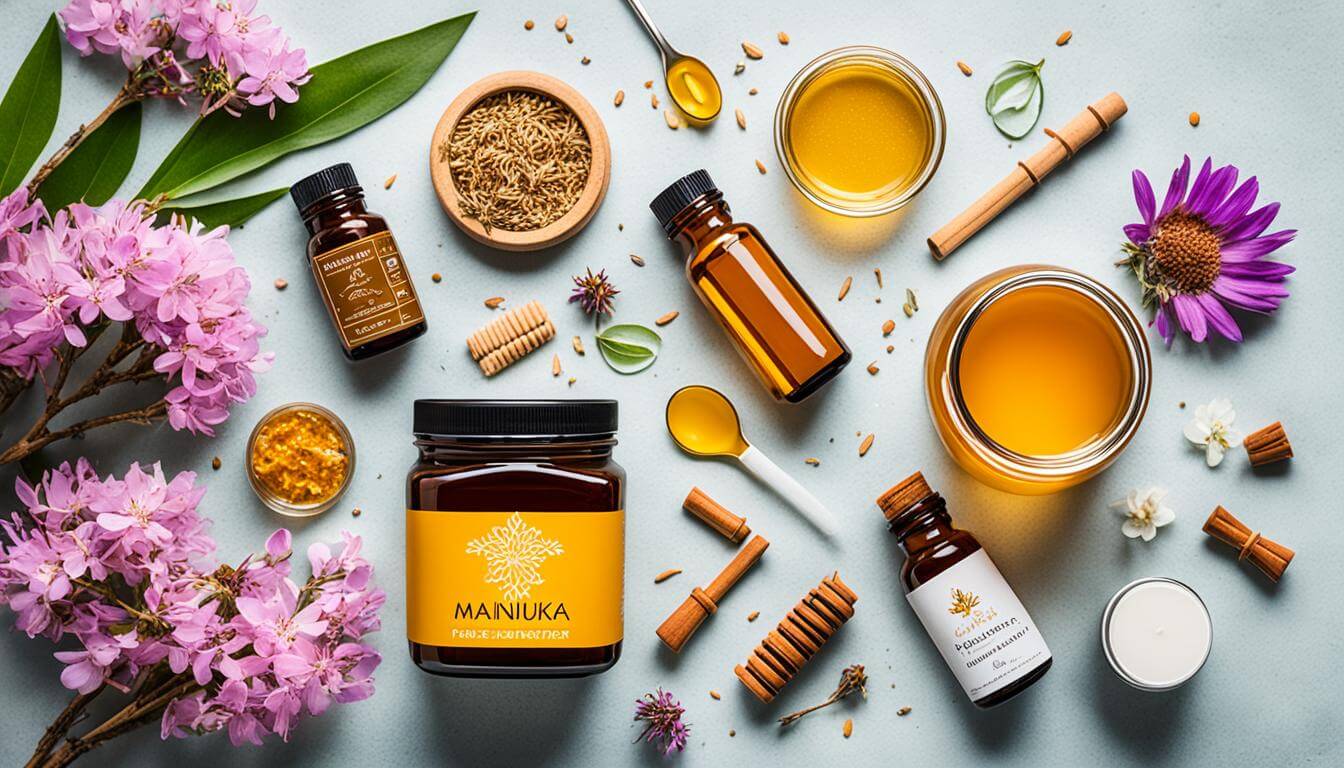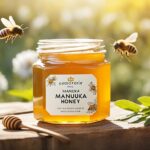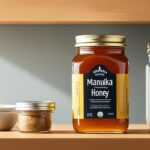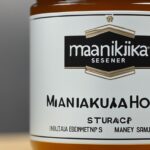As bustling bees meticulously craft their liquid gold, the world buzzes with tales of the remarkable Manuka Honey benefits. A natural elixir or a simple syrup? This golden nectar, sourced from New Zealand’s Manuka bush, has gilded itself in a reputation that spans beyond a mere sweetener; it has embedded itself in the heart of wellness cultures across the globe. But what is the truth behind Manuka Honey efficacy? Does the science sweeten the deal, or are we just indulging in sticky fables?
Join us in a journey through the hives and into the labs. We’ll comb through the facts and myths, exploring the role of Manuka honey within natural remedies and examining the real health benefits of Manuka Honey. Our quest is more than just to taste; it’s to discover whether this honey holds the key to health or if its story is a woven tapestry of well-marketed anecdotes. Indulge your curiosity — we may just find that the truth is sweeter than fiction.
What is Manuka Honey and its Unique Properties
Harvested from the indigenous Manuka bush of New Zealand, Manuka honey has captivated the attention of health enthusiasts worldwide. Unlike traditional honey types, Manuka honey is distinguished by its Unique Manuka Factor (UMF), a grading system that uniquely ranks the antibacterial strength and quality of Manuka honey. This remarkable natural product is celebrated not only for its rich flavor but also for the presence of powerful active compounds in Manuka honey, such as methylglyoxal (MGO), which contribute to its therapeutic potential.
Understanding the nuances of UMF ratings is critical for consumers looking to benefit from the honey’s properties. The UMF rating is a guarantee that the honey contains the key signature compounds, ensuring the honey’s purity and potency. As consumers seek assurances of authenticity, the UMF rating provides a trusted measure of the therapeutic substances inherent in New Zealand Manuka honey. Here’s a breakdown of what different UMF ratings indicate:
| UMF Rating | Minimum Methylglyoxal (MGO) | Antibacterial Activity |
|---|---|---|
| UMF 5+ | 83 mg/kg | Low |
| UMF 10+ | 263 mg/kg | Medium |
| UMF 15+ | 514 mg/kg | High |
| UMF 20+ | 829 mg/kg | Very High |
| UMF 25+ | 1200+ mg/kg | Ultra High |
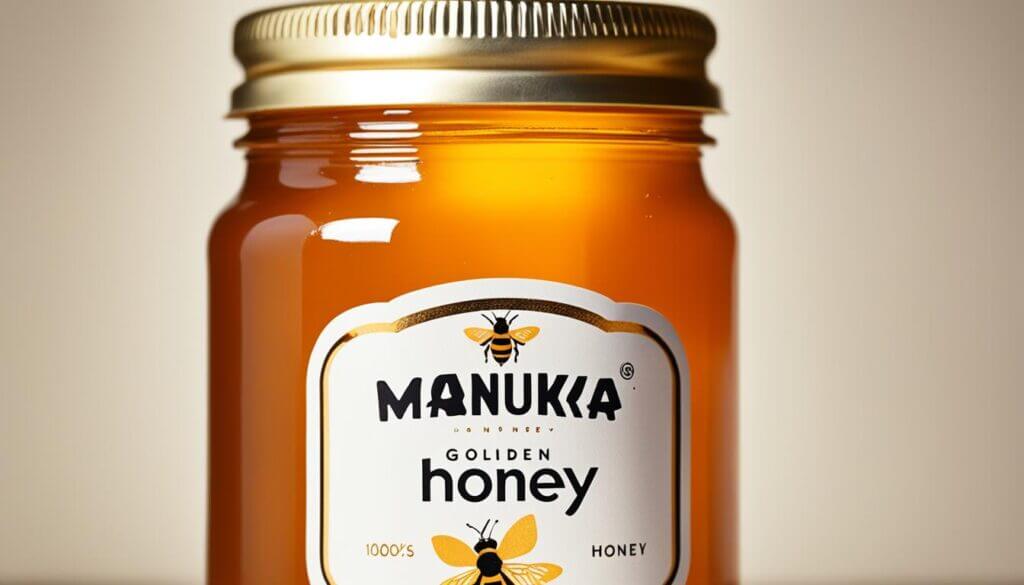
These ratings are imperative for discerning consumers because they not only reflect the concentration of MGO but also other active compounds in Manuka honey, such as leptosperin and dihydroxyacetone (DHA), which are responsible for the honey’s enhanced antibacterial potency. The multifaceted benefits of Manuka honey, stemming from these compounds, have made it a sought-after product for those pursuing a healthy lifestyle and natural alternatives.
When adding a jar of this unique honey to your pantry, it’s essential to be informed about what the labels and numbers mean, as they are indicators of the honey’s potential impact on health and wellness. The UMF certification is an assurance that what you’re buying is genuine New Zealand Manuka Honey, capable of delivering benefits beyond the scope of ordinary honey. Every spoonful is a taste of the natural treasure found in the picturesque landscapes of New Zealand, rich with the essence of the Manuka bush.
The Science Behind Manuka Honey Health Claims
Amongst natural health products, Manuka honey has garnered international acclaim, particularly for its antibacterial properties. In the realm of health research on Manuka Honey, numerous studies have sought to draw scientific evidence to back the traditional uses of this unique honey. This section aims to unfurl the outcomes of such Manuka Honey studies and discern the extent of their support in scientific literature.
One of the most significant constituents of Manuka honey is methylglyoxal (MGO), which has been extensively studied for its potential to combat bacteria. The findings from various laboratory analyses have indicated that Manuka honey can inhibit bacterial growth, lending credibility to its use in wound care and the treatment of topical infections.
- Assessment of antibacterial efficacy against common pathogens like Staphylococcus aureus and Escherichia coli
- Review of anti-inflammatory effects in the context of sore throats and digestive discomfort
- Evaluation of antimicrobial activity and its implications for oral health
However, it’s imperative to bear in mind that while lab-based outcomes are promising, real-world applications are subject to a wider array of variables. Thus, continued research is essential to fully understand the scope of Manuka honey’s benefits.
Further inquiry into its anti-inflammatory properties has also been carried out, with studies suggesting a potential role for Manuka honey in soothing inflammation, which could be beneficial in treating conditions like gastritis or even acne. Yet, it’s critical to note that these findings are preliminary and need to be supported by controlled clinical trials.
As a product that has traversed from traditional folk medicine to contemporary health aisles, the journey of Manuka honey has been stitched with both scientifically sound insights and overstated claims. For consumers and healthcare professionals alike, it’s essential to sift through the scientific narrative with a critical lens, to identify the genuine benefits that Manuka honey can offer.
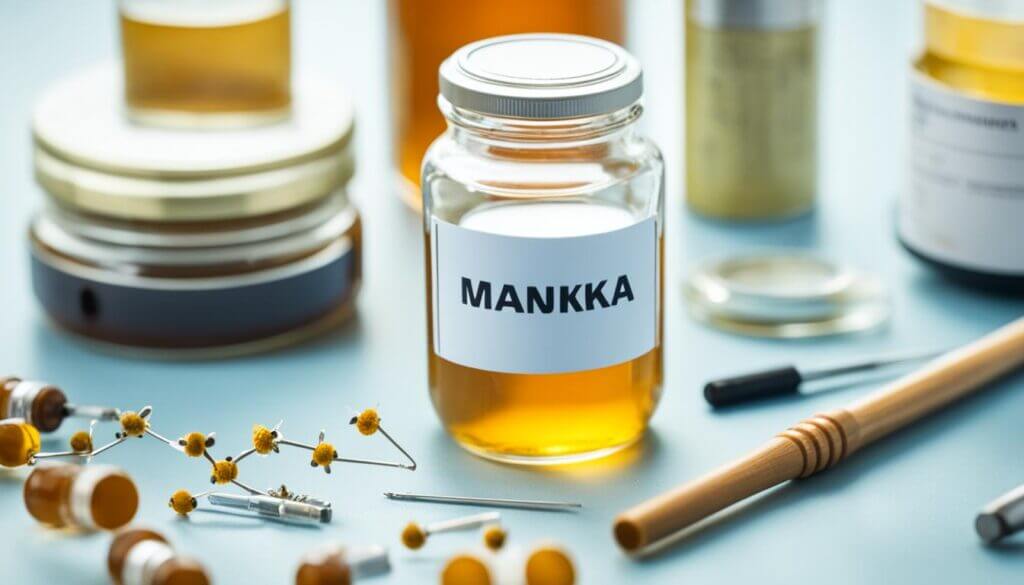
Debunking Myths: What Manuka Honey Can and Can’t Do
The allure of Manuka honey has captured the attention of health enthusiasts around the world, but along with its popularity come many health misconceptions and Manuka honey myths. It’s important to sift through these to discover the truth about Manuka honey and understand its limitations.
When evaluating the claims surrounding Manuka honey, we encounter a mix of truths and overstatements. Here are a few common myths that need clarification:
- Manuka honey can replace antibiotics: While research shows Manuka honey has antibacterial qualities, its potency is not sufficient to completely substitute prescribed antibiotics in treating infections.
- All Manuka honey is the same: The Unique Manuka Factor (UMF) rating system helps to grade Manuka honey’s potency, indicating that not all jars are created equal in terms of antibacterial strength.
- Manuka honey guarantees better health: Manuka honey may support overall health as a part of a balanced diet, but it is not a miracle cure for diseases or a replacement for a healthy lifestyle.
It’s crucial to approach the benefits of Manuka honey with a balanced perspective. Below is a table contrasting some of the popularly cited benefits with scientific realities.
| Claimed Benefit | Scientifically Supported? | Notes |
|---|---|---|
| Cures all types of bacterial infections | No | Effective against certain bacteria, but not a stand-alone cure for all infections. |
| Reduces inflammation and heals acne | Partially | Can soothe skin, but results vary and it’s not a universal remedy for acne. |
| Improves digestive health | Insufficient Evidence | Some studies suggest potential benefits, but more research is needed. |
| Boosts immune system | Insufficient Evidence | While nutritious, there’s no strong evidence that Manuka honey notably enhances the immune system. |
Manuka honey surely boasts several health benefits, but it’s vital to recognize its limitations and use it as a complement to traditional medical advice. Making informed choices based on credible sources can help you enjoy Manuka honey responsibly and effectively, without falling for the myths.
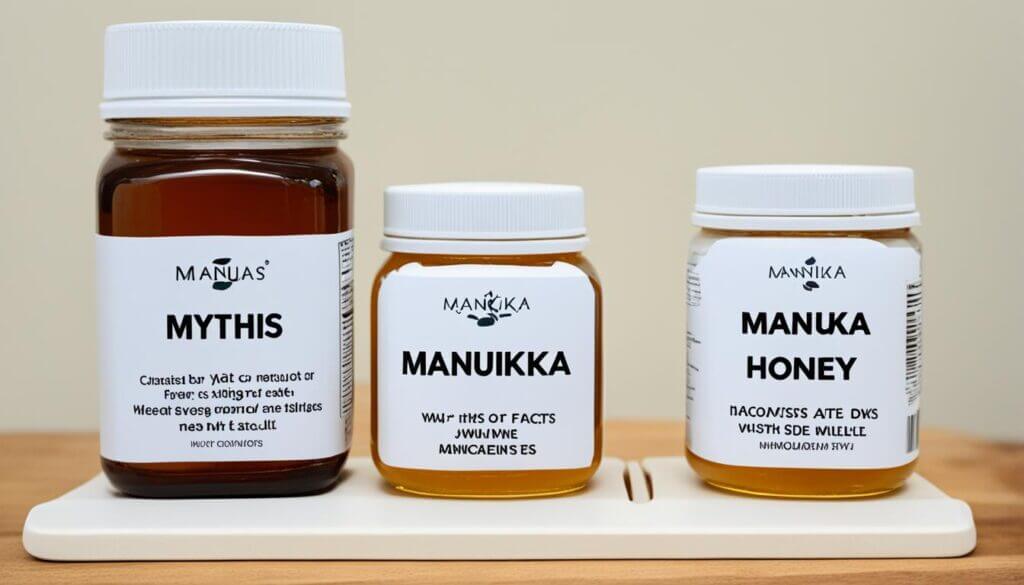
Manuka Honey in Alternative Medicine: Folklore vs. Facts
The wisdom of traditional uses of Manuka Honey has passed through generations, offering alternative health remedies for various ailments. In contrast, evidence-based alternative medicine scrutinizes these practices through the scientific lens to validate their efficacy. Join us as we unveil the relationship between age-old beliefs and modern research findings regarding Manuka Honey’s role in alternative therapy.
Manuka Honey’s journey from folklore to a respected name in alternative medicine is a testament to its unique properties. This natural elixir has been hailed for its potential anti-inflammatory and antibacterial effects, catching the attention of those seeking natural health solutions. Yet, separating fact from fiction is crucial in understanding its true contribution to health and wellness.
| Traditional Claim | Evidence-Based Findings |
|---|---|
| Improves wound healing | Studies confirm the antibacterial properties that promote tissue regeneration. |
| Alleviates sore throats | Research supports its antimicrobial and anti-inflammatory properties soothing the throat. |
| Aids in digestion | Clinical findings are mixed, with some evidence suggesting it can benefit gut health. |
| Improves skin conditions | Scientific research upholds its use in certain dermatological applications. |
| Boosts immunity | While commonly believed, more rigorous studies are needed to substantiate this claim. |
In the realm of alternative health remedies, anecdotal testimonies often compete with scientific research. Recognizing this, experts encourage an approach grounded in cautious optimism—a blend of respect for tradition and a demand for scientific validation. As more evidence-based studies emerge, a clearer picture of Manuka Honey’s place in alternative medicine is painted, ensuring that consumers are guided by both wisdom and knowledge.
Dissecting the Manuka Honey Grading System
When navigating the world of Manuka honey, understanding the grading systems can be as vital as choosing the honey itself. Manuka honey ratings, like UMF and MGO, signify the unique compound levels that dictate the Manuka honey potency. We will unravel these rating systems to explain how they contribute to the authenticity and traceability of Manuka honey, ensuring you make informed purchases.
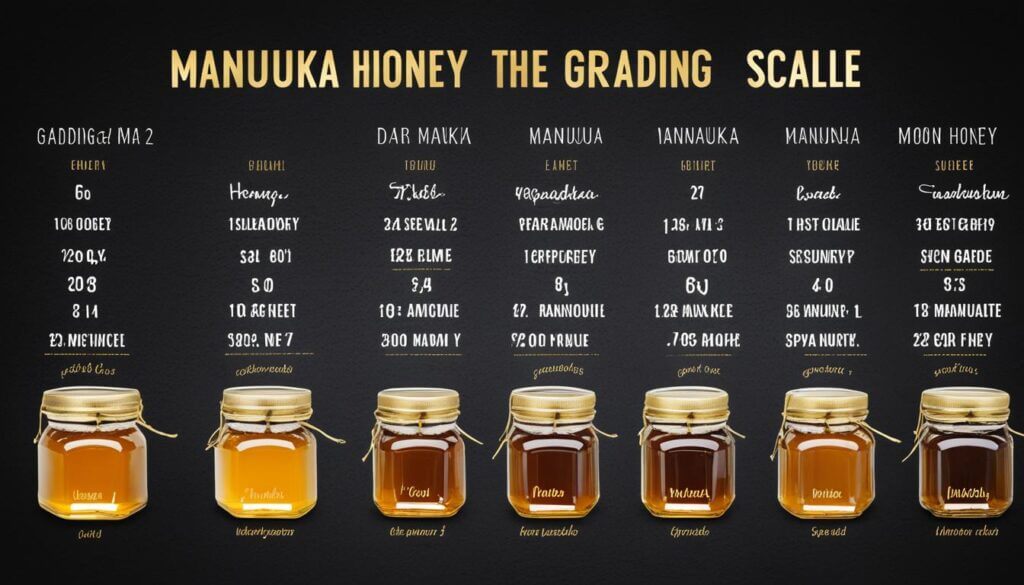
The Unique Manuka Factor (UMF) is perhaps the most recognized grading system, which assesses the purity and quality of Manuka honey. It measures not only the methylglyoxal (MGO) content but also other key indicators such as leptosperin and DHA (dihydroxyacetone). The UMF grading system certifies that the honey is genuine, of New Zealand origin, and has the special natural properties Manuka honey is known for.
- UMF 0-4: Not detectable for therapeutic use
- UMF 5-9: Low levels of beneficial compounds
- UMF 10-15: Useful levels for general health maintenance
- UMF 16+: Superior levels with high medicinal potential
MGO, on the other hand, provides a more direct measurement of the methylglyoxal compound, which is largely responsible for the antibacterial effects of Manuka honey. The MGO scale is much simpler to understand, as it directly reflects the MGO content per kilogram of honey.
| MGO Rating | UMF Comparison | Beneficial Properties |
|---|---|---|
| MGO 100+ | UMF 5+ | Minimum active levels |
| MGO 250+ | UMF 10+ | Maintenance of health benefits |
| MGO 400+ | UMF 13+ | High Antibacterial activity |
| MGO 550+ | UMF 15+ | Superior levels for therapeutic use |
In essence, both UMF and MGO rating systems serve as essential guides in explaining Manuka honey potency. As a rule of thumb, the higher the UMF or MGO rating, the stronger the antimicrobial efficacy and the more potent the honey. However, it’s not only about the numbers; these systems also guarantee that what you’re buying is authentic Manuka honey, safeguarding both your health interests and investment.
Consumer Tips: How to Choose the Right Manuka Honey
When you’re on the quest for the best Manuka honey, a deluge of options and claims can seem overwhelming. Recognizing authentic Manuka honey and ensuring you’re getting the full benefits of this unique natural resource requires an informed approach. Below, find a consumer guide curated to assist you in making a discerning purchase.
- Examine the UMF Rating: The Unique Manuka Factor (UMF) is a reliable measure of the honey’s potency and quality. Look for UMF 10+ as a minimum, with higher ratings indicating superior strength.
- Check for Purity: Ensure your Manuka honey is from New Zealand, the origin of authentic Manuka bushes, and check for any additives or blends which can dilute the power of pure Manuka honey.
- Research Brand Reputation: Buying Manuka Honey from reputable brands guarantees that you’re getting a product that’s been tested for authenticity and quality. Research brands and read consumer reviews before making a choice.
- Price as a Quality Indicator: While price shouldn’t be the only factor, high-quality Manuka honey often comes with a higher price tag due to its extensive testing and provenance.
- Look for Certification Marks: Third-party certifications, such as the UMF Honey Association label, indicate authentic Manuka honey that meets stringent standards.
- Avoid Counterfeit Products: Be wary of too-good-to-be-true prices and labels that don’t display the necessary certifications and ratings. These may be indicators of counterfeit or low-quality honey.
Empowered by these consumer tips, you can navigate the market for Manuka honey with confidence, ensuring your investment yields the richest flavor and the most potent benefits.
Personal Stories and Testimonials on Manuka Honey Uses
Exploring the array of Manuka Honey testimonials and user stories provides valuable insight into how individuals experience the benefits of this natural product. Through anecdotal evidence and personal experiences, we gain a broader understanding of its perceived effectiveness in daily life.
Below is a compilation of testimonials highlighting diverse applications and outcomes:
A fitness enthusiast noted that regular consumption of Manuka Honey seemed to enhance their post-workout recovery, believing it to possess anti-inflammatory properties that eased muscle soreness.
Another individual who struggled with persistent skin issues described how topical application of Manuka Honey helped to reduce the appearance and discomfort of their skin condition.
Stories from parents reveal they often turn to Manuka Honey as a natural soother for their children’s mild throat irritations, sharing their satisfaction with its soothing effects.
While these stories offer glimpses into the potential uses of Manuka Honey, let’s compare user-reported benefits with scientific findings:
| User-Reported Benefit | Anecdotal Evidence | Alignment with Scientific Data |
|---|---|---|
| Improved skin health | Several users reported a positive impact on skin conditions with topical applications. | Some studies suggest Manuka Honey can support wound healing due to its antibacterial properties. |
| Enhanced recovery from sore throats | Commonly used as a natural throat soother, especially among children. | Research indicates Manuka Honey may have antibacterial and antiviral properties that can be beneficial for sore throats. |
| Alleviation of digestive issues | Individuals have experienced relief from digestive discomfort after incorporating Manuka Honey into their diet. | Scientific backing is limited but some preliminary studies suggest potential digestive health benefits. |
These personal experiences and Manuka Honey testimonials provide context to the factual information previously covered, although it’s worth noting that outcomes can vary widely among different users. When considering the addition of Manuka Honey to your regimen, it’s important to remember that personal testimony should be weighed alongside empirical evidence to make an informed choice.
Manuka Honey Health Claims in Clinical Research
The exploration of Manuka honey’s therapeutic potential has progressed from anecdotal claims to rigorous scrutiny under the lens of clinical research. Ongoing investigations within the realm of evidence-based medicine continue to shed light on Manuka Honey research findings. These explorations aim to either authenticate the efficacy of Manuka honey or demystify overstated health assertions.
To appreciate the depth and scope of clinical trials involving Manuka honey, let’s examine several landmark studies:
- One notable investigation, published in the Journal of Wound Care, evaluated the effects of Manuka honey on chronic wound infections, highlighting its ability to promote healing and combat antibiotic-resistant strains of bacteria.
- Another study from the Antioxidants & Redox Signaling journal revealed Manuka honey’s potential in enhancing antioxidant activity and in combatting inflammation at a cellular level.
- Research presented in the Clinical Otolaryngology outline Manuka honey’s impact in treating symptoms of the upper respiratory tract, offering promise for those with recurrent sinusitis.
These studies underscore the importance of evidence-based validation in determining the medical applications of natural remedies. While more extensive research is vital to substantiate the full spectrum of Manuka honey’s capabilities, clinical trials thus far present an encouraging context for its application in certain therapeutic realms.
As clinical trials on Manuka honey continue to advance, they not only contribute to the body of evidence-based medicine but also serve as a beacon for consumers seeking natural health solutions grounded in scientific robustness. Stay tuned to the latest Manuka Honey research findings for informed decisions on harnessing the honey’s possible health benefits.
Conclusion
Reflecting on the intriguing journey through the world of Manuka honey and its myriad of health claims, we arrive at a critical juncture where discernment is key. Our exploration has led us to a Manuka Honey summary that unravels the facts from fiction, highlighting the unique properties that make it more than just a sweet indulgence. We’ve scrutinized the scientific studies, demystified common misconceptions, and provided you with the insights necessary for evaluating Manuka Honey claims effectively.
Through our examination, it is evident that while Manuka honey possesses promising health benefits, not all assertions hold up under the microscope of rigorous science. As we draw a health benefits conclusion, it is paramount to acknowledge the real therapeutic potential of Manuka honey, especially in its antibacterial and wound-healing efficacy, while also recognizing the limits of its capabilities.
The key takeaway from our discourse is the pivotal role of consumer education. Just as honeybees meticulously extract nectar to produce their liquid gold, so too must consumers gather knowledge to make evidence-based choices. In your pursuit of natural wellness, let the facts about Manuka honey guide you to sweet, scientifically-sound decisions.
